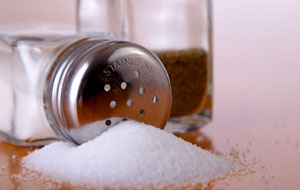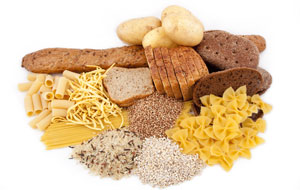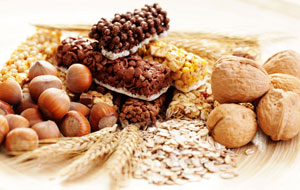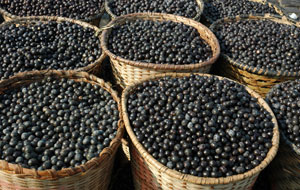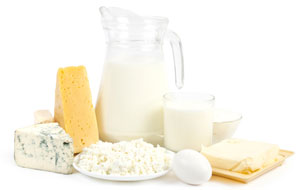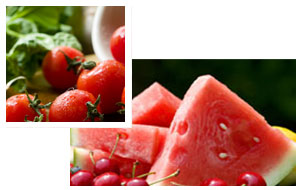Health & Wellness
Search Results
Articles
-
Food Allergies101
If you have or someone you know has a food allergy, you know how important it is to monitor what foods are consumed. From specific foods to food labels, it’s imperative to make sure you do not eat a foodstuff that will trigger an abnormal physiological response to your body....
-
Salt and Health
If you’ve ever tasted foods that have not been salted, you know that—depending on the dish—it can taste pretty bland. While salt enhances foods to a level that completely changes the taste, it’s important to know how salt can affect your health. Consuming too much salt can lead to too...
-
Hey, Sugar, Are You Getting Too Much Sugar?
Sugar is a simple carbohydrate that the body uses for energy, but too much added sugar can lead to health problems such as increased triglycerides (which may increase the risk of heart disease), tooth decay, poor nutrition, and weight gain. These are just a few health reasons why it’s important...
-
Choosing Carbohydrates for Good Health
Carbohydrates are a macronutrient found in many foods and beverages, and there are three main types of carbohydrates: fiber, starch and sugar. Fiber carbohydrates are made of sugar units bonded together and occur naturally in cooked dry beans, fruits, vegetables and whole grains. Starch carbohydrates are made of sugar units...
-
Health Benefits of Dietary Fiber
Dietary fiber is classified into two categories: insoluble and soluble. Insoluble fiber does not dissolve in water, while soluble fiber does. Insoluble fiber—found in nuts, wheat bran, whole wheat flour and many vegetables—helps promote the movement of material through the digestive system, increasing stool bulk. Soluble fiber—found in apples, barley,...
-
Acai Berry: A South American Superfood
If you’ve been searching for a food that offers numerous health benefits, you may want to keep your eyes peeled for the acai berry. Native to South America, the acai berry (pronounced ah-sigh-ee) is a grape-like fruit harvested from the acai palm tree. Acai berries taste like a blend of...
-
High-Fructose Corn Syrup
Chances are you’ve heard of high-fructose corn syrup. Also called corn sugar, high fructose corn syrup is the most widely added sweetener in processed foods and beverages, including cakes, candies, cereals, condiments, packaged foods like potato chips, and more. High-fructose corn syrup is made from corn kernels which are spun...
-
High Protein Diets
You may have heard about high protein dies such as Atkins, Protein Power, Stillman, and Sugar Busters. Some high protein diets are known for quick weight loss, but some of these diets restrict important carbohydrates like fruits, vegetables and low-fat dairy products. The problem with restricting carbohydrates from the diet...
-
Calcium
Calcium is a mineral found in many foods and in the body. In the body, calcium is known for building and maintaining strong bones and is mostly stored in bones and teeth. But calcium also impacts physiological activities, such as blood clotting, cell membrane function, muscle movement, carrying messages between...
-
Lycopene: An Antioxidant Dynamo
Guava, pink grapefruit, red bell peppers, red cabbage, tomatoes and watermelon each is a food high in lycopene, an antioxidant dynamo and carotenoid pigment and phytochemical. When absorbed from the stomach, lycopene is transported in the blood by lipoproteins where it accumulates in the adrenal glands, liver, and testes. Lycopene...
Foods
-
blackberry
High in fiber and folate, blackberries are also a good source of vitamin C and contain small amounts of iron, calcium and vitamin E.
-
blueberry
Blueberries can help reduce the risk of urinary tract infection, and their high antioxidant level helps reduce the buildup of bad cholesterol.
-
raisin
Very high in antioxidants and a good source of vitamin A, dried plums and raisins also contain vitamin E, potassium, iron and B vitamins, as well as magnesium and phosphorous.
-
eggplant
With only 25 calories per serving, healthy eggplant also contains dietary fiber, vitamin C, iron and potassium.
-
plum
High in vitamin C, plums contain some potassium, as well as riboflavin and other B vitamins.
-
purple grape
Free of fat, saturated fat, cholesterol and sodium, purple grapes are a healthy source of vitamin C, and are high in antioxidants!
-
purple potato
Purple potatoes contain the antioxidant glutathione and all of the nutrients of other potatoes. And did you know that one serving provides 45% RDI of vitamin C, 21% RDI of potassium and 3 grams of fiber?
-
artichoke
Fat free and a good source of vitamin C, this tasty veggie also contains cynarin.
-
asparagus
With 60% RDI of folic acid, asparagus is also a great source of vitamins A and C, as well as folate and carotenoids.
-
avocado
With a healthy content of folate, avocados are also one of the best sources of heart-healthy monounsaturated fat.
Glossary
-
antioxidants
counteract the oxidizing (burning) effects of free radicals, harmful molecules that can cause cellular damage throughout the body. Besides leading to heart and coronary artery disease by promoting the buildup of plaque in the walls of blood vessels, oxidation may increase your risk of developing health problems as diverse as cataracts and Alzheimer's disease. And oxidation can cause cellular damage that may eventually result in malignancy. Antioxidants can interrupt this process, potentially conferring protection from cancer. Some scientists believe that, in high enough doses, antioxidants can even reverse the growth of cancers that have already taken hold. The body produces its own antioxidants that combine with free radicals to help keep the oxidation process in check. But a number of scientists believe that the body often cannot produce enough antioxidants on its own, especially when confronted with exposure to environmental contaminants like cigarette smoke and polluted air. They recommend antioxidant supplementsand supplementation has, in fact, become extremely popular. When embarking on a regular supplementation program, however, it's important to keep two points in mind. First, there's a growing body of evidence suggesting that antioxidants in pill form may not provide the same benefits as those obtained from natural foods. Second, just as with many other substances, more of an antioxidant is not always better. Beyond certain levels, some actually become toxic. For instance, The U.S. Institute of Medicine has set an upper daily intake level of 2 grams for vitamin C and 1 gram for alpha-tocopherol (equivalent to about 1,500 IU of natural vitamin E or 1,100 IU of synthetic vitamin E). A high antioxidant level can help improve memory and reduce build-up of bad cholesterol.
-
beta carotene
A carotenoid that is stored in the liver, where the body converts it to vitamin A, as needed; found in dark, leafy greens and red, orange and yellow fruits and vegetables. A powerful antioxidant, beta carotene may play a role in slowing the progression of cancer. In population studies, it's related to decreased risk of lung cancer and oral cancers.
-
boron
Important to brain function, especially in enhancing memory, cognitive function, and hand-eye coordination. Evidence continues to mount that boron may reduce either the symptoms or incidence of arthritis.
-
calcium
The most plentiful mineral in the body and one of the most important. The body needs it to build and repair bones and teeth, help nerves function, make muscles contract, clot blood, and allow proper function of the heart. Almost all of the calcium in the body is stored in bone. The rest is found in the blood.
-
carotenoids
Help lower cholesterol, reduce the risk of heart disease and cancer, and help preserve vision. See also Beta Carotene
-
copper
Required for normal infant development, red and white blood cell maturation, iron transport, bone strength, cholesterol metabolism, myocardial contractility, glucose metabolism, brain development and immune function, among other things. The richest dietary sources of copper include nuts, seeds, legumes, the bran and germ portions of grains, liver, kidneys, shellfish, oysters and crustaceans.
-
cynarin
Stimulates bile secretion creating support for the liver and digestion and positively affects cholesterol and triglyceride levels in the blood
-
elegiac acid
A natural organic compound thought to inhibit the start of cancer caused by certain chemicals.
-
fiber, soluble
Aids in controlling high blood cholesterol; eating 3 grams a day can lower cholesterol levels by about 5%25 and protect against heart disease. See also Pectin
-
flavonoids
A group of compounds with antioxidant properties, are found in carrots, tea, citrus fruits, berries, broccoli, peppers, squash, tomatoes, soybeans, eggplant, and a variety of other fruits and vegetables. Besides their antioxidant activities, flavinoids seem to be able to inhibit the action of certain hormones such as estrogen, and may help prevent hormone-based malignancies such as breast cancer and prostate cancer. • Anthocyanins are naturally occurring compounds that impart color to fruit, vegetables, and plants. Derived from two Greek words meaning plant and blue, anthocyanins are the pigments that make blueberries blue, raspberries red, and are thought to play a major role in the high antioxidant activity levels observed in red and blue fruits and vegetables. Anthocyanins are also largely responsible for the red coloring of buds and young shoots and the purple and purple-red colors of autumn leaves. Close to 300 anthocyanins have been discovered; known to improve eye sight. • coumarins - A class of widely occurring phenolic compounds, especially abundant in citrus fruits, that may help the enzymes that fend off cancer rutin and hesperidin, which may prevent or slow tumor growth • kaempferol is a powerful anticancer agent; Black teas are excellent potential source of quercetin, kaempferol and myricetin in the human diet. • quercitin and myricetin, a flavanoid with antioxidant qualities, which helps eliminate free radicals in the body, inhibits low-density lipoprotein oxidation, protects and regenerates vitamin E and inactivates the harmful effects of chelate metal ions • resveratrol - fights breast, liver, and colon cancers; also anti-inflammatory
.jpg)

